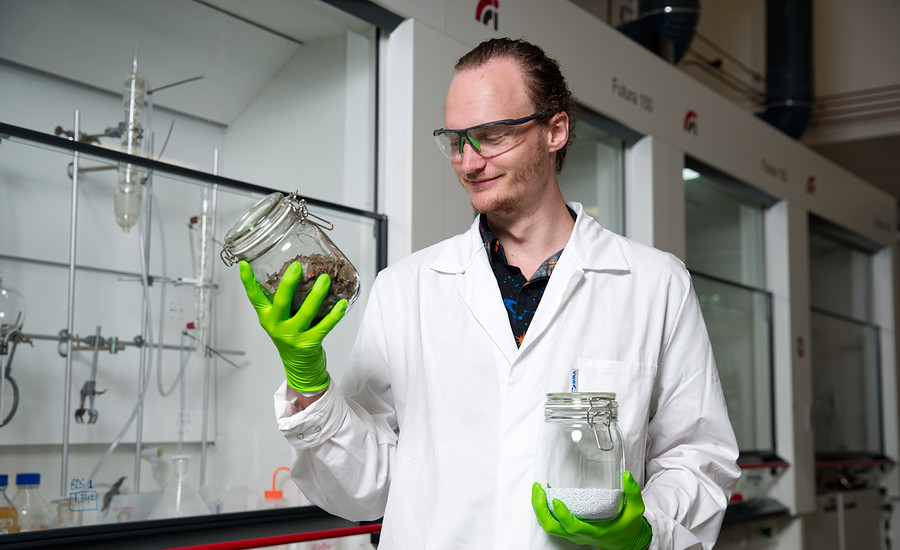The necessity of green chemistry: "We don't just want to change, we have to."
- News

Most of the raw materials we use to create the millions of products we use every day are not sustainable. They are finite, fossil-based and pollute the earth. That's why new, green alternatives are needed. Two chemists take us through why the transition to green, circular products is so necessary: professor of Biobased Chemistry André Heeres and chemistry lecturer-researcher Edzard Geertsema.
"We don't just want to change, we have to," André Heeres kicks off our conversation with the two colleagues in a convincing manner. "Ultimately, we want to move towards a sustainable society," Edzard Geertsema adds. "For me, the word sustainble is all-encompassing. Can we create a society where we meet our own needs, while ensuring future generations will have the same opportunities? The way I see it, André, is that green chemistry and especially circular chemistry are pillars for a sustainable society."
Heeres explains: "We have a number of problems now. We are exhausting our earth, we are using far too many resources and the earth is heating up because we are releasing far too much CO2 into the atmosphere. That CO2 comes mainly from oil-based products. We need to find an alternative for those. With green chemistry, we can use and develop renewable raw materials. We want to tap other sources. Sources that grow in nature and are reusable. Think of wood: if plant a tree you have a renewable supply of wood that can be made to be CO2 neutral."
"Replacing oil with green sources can only be successful if the amount of green materials you consume equals the green material you grow," Geertsema responds. "As with oil: we use more than the earth produces. The best way to become more sustainable is to use less. Instead of focusing on growth, we should take a step back: degrowth." André Heeres doesn't quite agree: "If we shape the circular transition in the right way, we don't need to take a step back."
Heeres: "There are four points that are important to maintain our standard of living. One: we need to use less. Two: we need to replace petroleum-based raw materials with renewable ones. Three: we need to keep materials in the chain for longer. So no buying cheap plastic that breaks after two uses and eventually ends up in the environment and breaks up into microplastics. Finally: we need to reuse materials much better. A good example is the PET bottle. You can wash them and reuse them. If the quality deteriorates, you can recycle mechanically. Low-quality, dirty bottles can be recycled chemically, a technique for which we use green chemistry. Circular, sustainable chemistry that prevents CO2 from entering the atmosphere. We can come up with ideas for that at the molecular level and do research on that."
All the conditions required to make the transition to biobased chemistry are present in our region, the gentlemen agree. "We are good at chemistry in this area, we have the godfather of chemistry in our midst, Nobel laureate Ben Feringa. Edzard did his PhD with him. We have the infrastructure and we have the chemical clusters. We have ports. We have facilities at all levels to do research. We have good cooperation between politics, business and knowledge institutions in our region. We are an agricultural area, we have sugar beet, potatoes, hemp... all materials that we can basically use to make plastics. We have renewable energy," Heeres lists.
Heeres and Geertsema explain how valuable the link between research and education is when it comes to preparing students for the job market in the region. Geertsema: "My role is to implement André's philosophy in education. What is green chemistry? What is sustainability? What can the earth withstand? What are the limits of our planet? We inspire students from year 1 on how they can contribute to a sustainable society. For example, we make a new biopolymer, biodegradable green plastic, from agricultural residues. Those waste streams are converted by bio-organisms. Not only do these polymers come from a renewable source, they are also biodegradable. Students have investigated how to efficiently extract the polymers from micro-organisms. Now, quite nasty chemical solvents are used for this purpose, for which the students have found an alternative."
So why are we still using fossil-based resources? "The processes for products made with petroleum have existed for 50 years and have been completely optimised," Heeres explains. "These are carried out on a huge scale. The prices of plastic from oil are super low. Edzard and I have to compete with that with our new small-scale inventions. Competing against a stronghold that prefers to continue until all the oil runs out. On 1 February, Shell released its quarterly figures again: over 6 billion profit in one quarter. Profit, not turnover! That's more than chemical group DSM is worth. And don't underestimate their lobbying either. With that much money, you can put enormous pressure on politicians. Still, we believe that as a society we can make the transition and remain fully committed to this."

Want to know more about the professorship Biorefinery?
Visit the professorship pageHow satisfied are you with the information on this page?